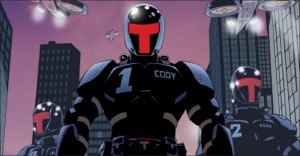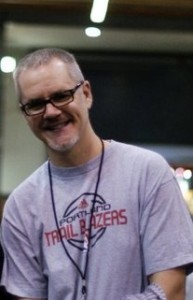Publishing Talks: David Wilk interviews Liam Sharp and Ben Abernathy of Madefire
January 6, 2014 by David
Filed under Ebooks and Digital Publishing, PublishingTalks, Technology
 Publishing Talks began as a series of conversations with book industry professionals and other smart people about the future of publishing, books, and culture. As we continue to experience disruption and change in all media businesses, I’ve been talking with some of the people involved in our industry about how they believe publishing might evolve as our culture is affected by technology, climate change, population density, and the ebb and flow of civilization and economics.
Publishing Talks began as a series of conversations with book industry professionals and other smart people about the future of publishing, books, and culture. As we continue to experience disruption and change in all media businesses, I’ve been talking with some of the people involved in our industry about how they believe publishing might evolve as our culture is affected by technology, climate change, population density, and the ebb and flow of civilization and economics.
Recently, the series has been expanding recently to include conversations about a wider range of subjects than my initial interest in the future of publishing. I’ve talked with editors and publishers who have been innovators and leaders in independent publishing in the past and into the present, and will continue to explore the past, present and future of writing, books, and publishing in all sorts of forms and formats, as change continues to be the one constant we can count on.
It’s my hope that these conversations can help us understand the outlines of what is happening in publishing and writing, and how we might ourselves interact with and influence the future of publishing as it unfolds. This week’s interview reflects my interest in comic art, illustrated story telling and new technology as a platform for expanding story telling in interesting and challenging ways.
Madefire is a very cool development in the evolution of technology platforms that enable digital storytelling. Founded by Ben Wolstenholme, Eugene Walden and artist/writer Liam Sharp, Madefire has big ambitions, and has drawn significant support from investors, creators and readers. In their own words, it’s a big play: “Madefire is undertaking an epic journey – One that we believe will revolutionize how stories are told, read, and shared. One that will transform a once static medium into an interactive experience that unfolds dynamically on mobile devices, and evolves with each new episode. It’s our Motion Book Tool that will make all this possible. We built it to unite the timeless beauty of sequential art with cutting-edge technology, and to give new creative freedom to the world’s most visionary creators and storytellers. All in the service of advancing the art of storytelling.”
At the October 2013 New York Comicon, I had a chance to get a demo of the software in action and was impressed by the Madefire approach, which provides comic artists with a whole new set of tools to enhance the visual storytelling mode in digital form. What is most appealing is the organicism of the approach – they are not trying to overwhelm us with game based features, but enabling the creators to expand their vision and engage their readers. It is indeed a big project and new developments continue to emerge. They call what they are making “Motion Books” which gets across pretty clearly what they are after. Their alliance with DeviantArt is a mind opening approach to publishing and engaging with communities of readers and creators online.
For this Publishing Talks interview, I spoke with both founder and CCO Liam Sharp and editor Ben Abernathy, formerly a group editor at DC Comics. I highly recommend downloading the Madefire app and experiencing some of the work that has been made using the Madefire tools. Listeners please note, this is a relatively long interview at just over 40 minutes.

Podcast: Play in new window | Download
Publishing Talks: David Wilk interviews Michael Jacobs
March 19, 2011 by David
Filed under Ebooks and Digital Publishing, Publishing History, PublishingTalks, The Future
 In this series of interviews, called Publishing Talks, I have been talking to book industry professionals and other smart people about the future of publishing, books, and culture. This is a period of disruption and change for all media businesses. We must wonder now, how will publishing evolve as our culture is affected by technology, climate change, population density, and the ebb and flow of civilization and economics?
In this series of interviews, called Publishing Talks, I have been talking to book industry professionals and other smart people about the future of publishing, books, and culture. This is a period of disruption and change for all media businesses. We must wonder now, how will publishing evolve as our culture is affected by technology, climate change, population density, and the ebb and flow of civilization and economics?
I hope these Publishing Talks conversations can help us understand the outlines of what is happening in the publishing industry, and how we might ourselves interact with and influence the future of publishing as it unfolds.
These interviews give people in and around the book business a chance to talk openly about ideas and concerns that are often only talked about “around the water cooler,” at industry conventions and events, and in emails between friends and they give people inside and outside the book industry a chance to hear first hand some of the most interesting and challenging thoughts, ideas and concepts being discussed by people in the book business.
Michael Jacobs is the Chief Executive Officer at Abrams Books. He started out in publishing as a page in the main branch of the Oakland (CA) Public Library and was the first sales rep hired by Bookpeople, the innovative and much missed employee-owned Berkeley wholesaler of independent press books (which is when I first met him – late 1970s).
From there Michael moved to Penguin USA, starting as a sales representative based in the Pacific Northwest and quickly rising to become President of the Viking Penguin division and a member of the board of directors. He then served as Executive Vice President of Simon and Schuster’s Trade division, Publisher of the Free Press, and Senior Vice President in Scholastic’s trade book group.
At Scholastic, Michael was responsible for the publishing, marketing, sales and distribution of the most successful books in publishing history—the first five Harry Potter books, which sold over 80 million copies in the US. He joined Abrams in 2004, and has directed the company successfully through virtually a complete business makeover. During his time at Abrams, the company has launched the best-selling Wimpy Kid series – which has sold 42 million copies in North America and has been published in over 36 countries, as well as a number of other highly successful books and series.
Founded by Harry N. Abrams in 1949, Abrams was the first company in the United States to specialize in the creation and distribution of art and illustrated books. It is now a subsidiary of La Martinière Groupe. Abrams is best known as a publisher of high quality illustrated books, especially art, photography, cooking , gardening, crafts, sports and children’s books. In recent years, under Michael’s direction Abrams has successfully broadened its reach, especially in pop culture and comic arts. I wanted to talk to Michael about his work at Abrams – not the least because illustrated books have faced so many different kinds of challenges in the past few years and he and his team at Abrams have been so successful throughout. But I also think his experience across a variety of trade publishing genres and company sizes (independent press, adult, childrens and illustrated books, large companies as well as smaller ones) gives him a unique perspective on the past, present, and future of publishing, in both print and digital formats that is valuable for others in the book industry to hear.
Michael’s success at Abrams may provide ideas and inspiration to many in publishing who are looking for ways to help remake their companies as the retail landscape continues to evolve and change. He is always cogent and incisive in his thoughts, and is someone whom I have always enjoyed talking with about books and ideas.
Podcast: Play in new window | Download

